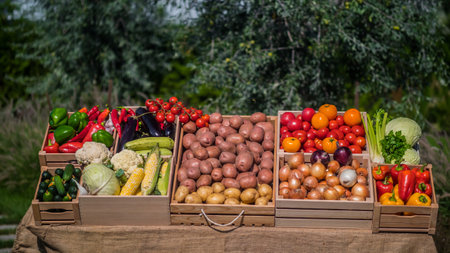Introduction to Herbal Remedies in the UK
The British Isles have a rich and enduring tradition of herbal medicine, woven deeply into the fabric of local communities. For centuries, people across the UK have turned to the natural world for health and wellness solutions, drawing on knowledge passed down through generations. From bustling city apothecaries to rural cottage gardens, herbal remedies have long played a vital role in everyday life. Even today, as modern medicine advances, interest in plant-based therapies and natural boosters remains strong throughout the country. This renewed appreciation is not only rooted in history but also reflects a desire for holistic well-being and sustainable living. As we explore both the historical roots and contemporary applications of British herbalism, it becomes clear that these time-honoured practices continue to offer gentle yet effective support for mind and body.
2. Historical Herbs and Their Traditional Uses
The British countryside has long been home to a wealth of herbs, many of which have woven themselves into the fabric of daily life for centuries. Among the most cherished are elderflower, nettle, and hawthorn—plants celebrated not only for their natural beauty but also for their potent health-giving properties. Understanding how these herbs were traditionally used offers valuable insight into the roots of modern herbal wellness in the UK.
Elderflower: A Gentle Soother
Elderflower, with its delicate white blossoms, has historically been used in Britain as a soothing remedy for colds and flu. Infusions made from elderflowers were commonly sipped to help ease fevers, support respiratory health, and gently promote sweating. Its subtle floral notes also made it a favourite addition to homemade cordials and syrups, bringing both flavour and wellness to the table.
Nettle: The Nutritious Powerhouse
Nettle may be prickly to touch, but it has earned a respected place in British folk medicine. Traditionally, nettle leaves were steamed or brewed as a tea to help cleanse the body and support vitality. Rich in vitamins and minerals, nettle was often consumed as a spring tonic—a gentle way to refresh the system after winter’s chill. Folk wisdom suggested it could help soothe joint discomfort and boost overall energy levels.
Hawthorn: The Heart Protector
Hawthorn’s vibrant berries and delicate blossoms have been associated with heart health across generations. In rural communities, hawthorn teas or tinctures were commonly prepared to support circulation and maintain a healthy heart. This tradition reflects both the reverence for nature’s pharmacy and the close relationship between local plants and everyday wellbeing.
Traditional Uses of Classic UK Herbs
| Herb | Traditional Uses | Common Preparations |
|---|---|---|
| Elderflower | Support for colds, flu, and fevers; gentle diuretic | Teas, syrups, cordials |
| Nettle | Spring tonic; supports joint comfort; rich nutritional profile | Steamed greens, infusions, soups |
| Hawthorn | Circular support; traditional heart tonic | Teas, tinctures, jams |
A Legacy Carried Forward
The enduring use of these herbs highlights the deep-rooted connection between people and nature in British culture. Passed down through generations, these time-honoured remedies continue to inspire both curiosity and respect for herbal traditions as they find their place in contemporary wellness practices.
![]()
3. From Countryside to City: Herbal Practices Across Eras
Herbal wisdom in the UK has deep roots in rural traditions, where generations relied on the land for health and wellbeing. In villages and hamlets, knowledge of local plants—such as nettle, elderflower, and dandelion—was passed down through families, often with recipes for soothing teas, tinctures, or healing poultices. This countryside expertise was shaped by the rhythms of the seasons and a close relationship with nature.
As Britain urbanised during the Industrial Revolution and beyond, herbal practices adapted to new environments. City dwellers brought folk remedies with them, sometimes blending them with influences from other cultures that settled in bustling towns like London, Manchester, and Birmingham. Traditional herbalists continued their craft in urban markets, offering remedies alongside fresh produce and flowers.
Home Gardens: A Natural Haven in Urban Spaces
Today, many Britons continue this legacy by cultivating herbs at home—even in the heart of busy cities. Window boxes filled with mint, thyme, or rosemary brighten up flats and provide easy access to natural boosters for cooking or wellness teas. Community gardens have also become sanctuaries where neighbours share seeds and stories about age-old remedies, reinforcing a sense of connection to both heritage and health.
Urban Foraging: Rediscovering Nature’s Bounty
The resurgence of urban foraging is another sign of herbalism’s enduring appeal. Parks, canal paths, and even forgotten corners of city landscapes now attract those keen to find wild garlic, hawthorn berries, or chickweed—all valued by earlier generations for their nourishing qualities. Guided walks and workshops help city residents safely identify edible plants while respecting local ecosystems.
A Bridge Between Past and Present
This blend of rural tradition and contemporary urban living highlights the ongoing relevance of herbal remedies in the UK. Whether through tending a small kitchen garden or joining a community foraging group, modern Britons are rediscovering practical ways to weave natural boosters into daily life—honouring history while embracing modern wellbeing.
4. Modern Applications: Scientific Validation and Contemporary Use
In recent years, the UK has witnessed a resurgence in interest towards herbal remedies, backed by a growing body of scientific research. Traditional British herbs such as nettle, elderflower, and dandelion are now being closely studied for their health-promoting properties. Universities and research institutions across the country are conducting studies to validate the efficacy of these plants, offering new insights into how they can be integrated into modern health routines.
Many British households are embracing natural boosters not only as supplements but also as integral parts of daily meals. This shift is reflected in the increasing availability of herbal teas, tinctures, and culinary products made from native herbs on supermarket shelves. Health-conscious Britons are incorporating these time-honoured ingredients into smoothies, salads, and even baked goods, blending tradition with contemporary nutritional needs.
Recent Research Highlights on British Herbs
| Herb | Active Compounds | Research Findings | Common Modern Uses |
|---|---|---|---|
| Nettle | Vitamins A & C, Iron | May reduce inflammation and support joint health | Teas, soups, supplements |
| Elderflower | Flavonoids, Antioxidants | Shown to help boost immunity and ease cold symptoms | Cordials, teas, syrups |
| Dandelion | Potassium, Inulin | Supports liver function and digestion | Salads, coffee substitutes, tonics |
| Lemon Balm | Rosmarinic acid | Potentially reduces anxiety and promotes calmness | Tisanes, infused oils, desserts |
| Hawthorn Berry | Proanthocyanidins | Aids cardiovascular health according to clinical studies | Syrups, capsules, jams |
The Integration of Natural Boosters in British Lifestyles
The movement towards natural wellness is shaping modern British habits in subtle yet significant ways. Urban markets in cities like London and Bristol now offer freshly foraged herbs alongside organic produce. Local cafes promote seasonal menus featuring wild garlic or watercress pesto. Additionally, many Britons are turning to holistic therapies—such as aromatherapy using native lavender or rosemary—to complement conventional healthcare.
Adopting Herbal Remedies Responsibly
The NHS and registered herbal practitioners emphasise the importance of sourcing herbs responsibly and consulting professionals before beginning any new supplement regime. This balanced approach ensures safety while honouring the centuries-old wisdom embedded in British culture.
5. Herbal Remedies in British Daily Life Today
In the UK, herbal remedies are woven seamlessly into the fabric of daily living, reflecting both tradition and a growing awareness of natural wellness. Across the country, people of all ages incorporate herbs in various practical ways—each method offering its own unique benefits for mind and body.
Herbal Teas: A Comforting Ritual
For many Britons, herbal teas serve as a gentle introduction to the world of plant-based wellness. Chamomile tea remains a favourite for soothing stress and encouraging restful sleep, while peppermint is prized for its digestive benefits. Elderflower and nettle teas, rooted in British folk tradition, are now common in high street cafes and home kitchens alike, enjoyed both for their taste and natural health-supporting properties.
Tinctures and Supplements: Modern Adaptations
Busy lifestyles have brought about a resurgence in tinctures—concentrated herbal extracts taken by the drop. These liquid remedies allow individuals to easily integrate plants like echinacea, valerian, or milk thistle into their routines, whether at home or on-the-go. Likewise, capsules and wellness supplements containing blends of British-grown herbs are increasingly popular in local health shops, appealing to those seeking a convenient yet natural boost to immunity or energy levels.
Cooking with Herbs: Flavour Meets Function
The British kitchen has always celebrated fresh herbs—not just for their flavour but also for their well-known health benefits. Adding rosemary to roast potatoes or parsley to soups does more than enhance taste; it brings centuries-old wisdom into every meal. Many households now also experiment with less familiar botanicals like lemon balm or dandelion greens, inspired by traditional recipes and new research highlighting their nutritional value.
Community and Wellness Culture
The renewed interest in herbal remedies is reflected in local markets and community events across the UK. Workshops on growing your own herbs, blending teas, or crafting salves from native plants are commonplace. This collective movement supports not only individual wellbeing but also fosters a sense of connection—to nature, heritage, and each other.
Gentle Integration for Everyday Balance
Ultimately, the British approach to herbal remedies today is characterised by balance—an appreciation for both time-honoured traditions and modern science. By embracing gentle practices such as sipping herbal infusions or adding a handful of fresh mint to salads, people throughout the UK continue to nurture their health in ways that feel authentic and sustainable.
6. Responsible Use and Sustainable Sourcing
As the popularity of herbal remedies and natural boosters continues to rise in the UK, it is increasingly important to consider both the responsible use of these products and the sustainability of their sourcing. Traditional British herbalism often relied on locally foraged plants, but today’s market features a wide variety of domestic and imported botanicals. For UK consumers, making informed choices can help protect both personal health and the environment.
Ethical Sourcing: Supporting Sustainability
When purchasing herbs and natural supplements, look for suppliers that prioritise ethical harvesting methods. This includes supporting British growers who use organic farming practices and choosing brands that are transparent about their supply chains. Where possible, opt for locally grown herbs such as nettle, elderflower, or chamomile, which thrive in the UK climate and reduce the carbon footprint associated with transportation. Certifications like Soil Association Organic or FairWild provide reassurance that products have been sourced with care for ecosystems and communities.
Ensuring Safety When Using Herbal Remedies
Natural does not always mean risk-free. Before incorporating any new remedy into your routine, consult with a qualified herbalist or healthcare professional—especially if you are pregnant, breastfeeding, taking prescribed medication, or managing chronic health conditions. Always follow recommended dosages and check for potential interactions with other supplements or pharmaceuticals. Avoid self-foraging unless you are confident in plant identification, as some native species can be easily confused with toxic lookalikes.
Practical Tips for UK Consumers
1. Buy from reputable retailers who can provide information about origin and quality.
2. Prefer UK-grown herbs when available to support local agriculture and minimise environmental impact.
3. Store dried herbs properly—in airtight containers away from direct sunlight—to maintain potency.
4. Respect wild populations by only harvesting small amounts (if at all) and avoiding endangered species.
5. Educate yourself through trusted resources such as The National Institute of Medical Herbalists or local botanical gardens offering workshops.
By combining traditional wisdom with modern awareness of sustainability and safety, UK consumers can enjoy the benefits of herbal remedies while supporting both personal wellbeing and environmental stewardship.
7. Conclusion: Embracing Nature for Everyday Wellbeing
As we reflect on the renewed interest in herbal traditions across the UK, it is heartening to see how Britons are weaving together centuries-old wisdom with modern scientific understanding. From the rolling meadows of the English countryside to bustling urban wellness shops, natural remedies and botanical boosters are experiencing a quiet renaissance. This harmonious blend of history and contemporary knowledge has inspired many to approach wellbeing in a more holistic and conscious manner.
Today, more people are looking beyond conventional medicine, seeking gentle, plant-based alternatives that support both body and mind. Whether it’s brewing a cup of chamomile tea after a long day or adding nettle infusions to one’s morning routine, these practices connect us to our cultural roots while nurturing our present-day health.
The British tradition of valuing nature’s gifts is evolving, with individuals thoughtfully integrating time-honoured herbs into daily self-care rituals. By appreciating the rich legacy of herbalism and embracing new research, Britons are fostering a balanced lifestyle—one that honours the past yet feels entirely relevant in today’s fast-paced world.
In embracing nature for everyday wellbeing, we find not only physical nourishment but also a deeper sense of connection—to the land, to tradition, and to ourselves. As this movement continues to grow, it holds the promise of supporting healthier communities and inspiring future generations to cherish the natural world around them.


